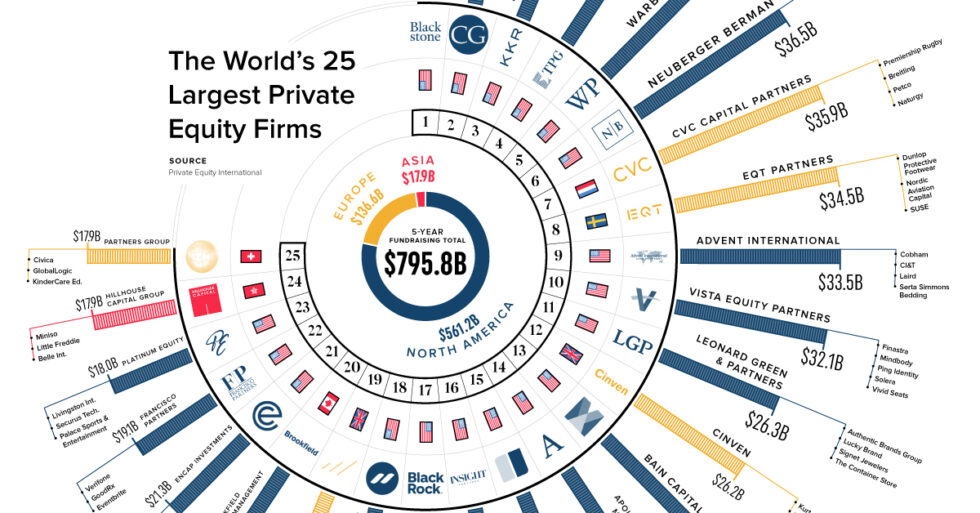Private equity firms are professionally managed investment funds that invest in private companies, aiming to acquire controlling or significant minority stakes. For instance, Verod Capital Management is a notable private equity firm in Nigeria that has invested in companies such as ARM Life and Eterna Plc.
Private equity plays a crucial role in boosting economic growth by providing capital to private companies, often fueling their expansion, innovation, and job creation. Historically, private equity has been instrumental in financing groundbreaking companies that have transformed industries, such as Amazon and Alphabet.
This article explores the landscape of private equity firms in Nigeria, examining their investment strategies, performance, and impact on the country's economic development.
- Facecheck Id Your Ultimate Guide To Identity Verification Solutions
- Masa49 Exploring The Unique Aspects And Importance Of The Masa49 Concept
Private Equity Firms in Nigeria
Private equity firms play a significant role in the Nigerian economy, providing capital and expertise to private companies. Key aspects to consider when evaluating private equity firms in Nigeria include:
- Investment strategy
- Target industries
- Deal size
- Performance
- Team experience
- Investment horizon
- Exit strategy
- Regulatory environment
These aspects are crucial for understanding the investment approach, risk profile, and potential returns of private equity firms operating in Nigeria. By carefully considering these factors, investors can make informed decisions about allocating capital to private equity funds.
Investment strategy
Investment strategy is a critical aspect of private equity firms in Nigeria, shaping their approach to investing in private companies and influencing their overall performance. Private equity firms employ diverse investment strategies, each with its own unique characteristics and implications.
- Brandi Passante Nude Pics A Comprehensive Analysis And Understanding
- Exploring Ullu The Rising Star In The Indian Entertainment Industry
- Sector Focus
Private equity firms may focus on specific sectors or industries, such as healthcare, financial services, or technology. Sector expertise allows them to identify attractive investment opportunities and leverage their domain knowledge to support portfolio companies. - Growth vs. Value
Some firms prioritize investing in growth companies with high potential for rapid expansion, while others focus on value investments in companies that are undervalued or have turnaround potential. - Deal Size
Private equity firms may target investments of varying sizes, from small and mid-market companies to large-cap acquisitions. Deal size influences the potential returns and risks associated with each investment. - Investment Horizon
Private equity firms typically have a fixed investment horizon, ranging from three to seven years. This horizon determines the duration for which they hold investments and influences their exit strategies.
Understanding the investment strategy of a private equity firm is crucial for investors considering allocating capital. By aligning with a firm's strategy and risk appetite, investors can potentially maximize their returns and achieve their investment objectives.
Target industries
Target industries are a critical component of private equity firms in Nigeria, shaping their investment strategies and overall performance. By focusing on specific sectors or industries, private equity firms can develop deep domain knowledge, identify attractive investment opportunities, and leverage their expertise to support portfolio companies.
Private equity firms in Nigeria often target industries with high growth potential, favorable regulatory environments, and strong demand drivers. Key target industries include:
- Financial services
- Healthcare
- Consumer goods
- Technology
- Energy
For example, Verod Capital Management, a leading private equity firm in Nigeria, has a strong track record in the financial services sector. The firm has invested in various financial institutions, including banks, insurance companies, and asset management firms. By leveraging its expertise in the industry, Verod Capital has been able to identify and invest in promising companies, generating significant returns for its investors.
Understanding the target industries of private equity firms is essential for investors considering allocating capital. By aligning with a firm's industry focus and investment strategy, investors can potentially maximize their returns and achieve their investment objectives.
Deal size
Deal size is a crucial aspect of private equity firms in Nigeria, influencing their investment strategies, risk profiles, and overall performance. Private equity firms typically target investments within a specific range, depending on their investment strategy and the availability of attractive opportunities in the market.
Larger deal sizes often indicate significant capital deployment by private equity firms and can have several implications. Firstly, larger deals may provide greater diversification benefits to investors, reducing overall portfolio risk. Secondly, they may allow private equity firms to acquire controlling stakes in target companies, giving them more influence over strategic decision-making and the potential to drive value creation.
A prime example of a large deal size in the Nigerian private equity landscape is the acquisition of a majority stake in Airtel Nigeria by Helios Investment Partners in 2022. The deal, valued at over $1 billion, demonstrates the growing appetite of private equity firms for large-scale investments in Nigeria's telecommunications sector.
Understanding deal size is essential for investors considering allocating capital to private equity funds. By aligning with a firm's deal size preferences and risk tolerance, investors can potentially maximize their returns and achieve their investment objectives.
Performance
Performance is a critical component of private equity firms in Nigeria, as it directly impacts their ability to generate returns for investors and achieve their investment objectives. The performance of a private equity firm is typically measured by its internal rate of return (IRR) and its ability to generate consistent returns over multiple investment cycles.
Several factors contribute to the performance of private equity firms in Nigeria, including their investment strategy, team experience, and the overall economic environment. Firms with a well-defined investment strategy that focuses on specific sectors or industries tend to perform better than those with a more generalist approach. Additionally, firms with experienced investment teams that have a proven track record of success are more likely to generate strong returns.
The economic environment also plays a significant role in the performance of private equity firms in Nigeria. A strong and growing economy provides more opportunities for private equity firms to invest in high-growth companies and generate attractive returns. Conversely, a weak or volatile economic environment can make it more challenging for private equity firms to find suitable investment opportunities and achieve their desired returns.
Understanding the performance of private equity firms in Nigeria is essential for investors considering allocating capital to these funds. By carefully evaluating the performance of a private equity firm over multiple investment cycles, investors can make informed decisions about which funds to invest in and potentially maximize their returns.
Team experience
Team experience is an essential component of private equity firms in Nigeria, as it directly impacts their ability to identify, execute, and manage investments successfully. The experience of a private equity team can be a key differentiator in a competitive market, influencing the firm's investment performance and overall returns.
One of the main reasons why team experience is critical in private equity is that it provides firms with the knowledge and expertise to make sound investment decisions. Experienced investment professionals have a deep understanding of the industries they invest in, enabling them to identify attractive opportunities and assess the potential risks involved. They also have a network of contacts and relationships that can be leveraged to source deals and gain insights into market trends.
For example, consider the case of Helios Investment Partners, a leading private equity firm in Nigeria. The firm's team has extensive experience in the telecommunications, financial services, and consumer goods sectors. This experience has enabled Helios to identify and invest in high-growth companies in these industries, generating strong returns for its investors.
In conclusion, team experience is a critical component of private equity firms in Nigeria, influencing their ability to generate attractive returns for investors. By carefully evaluating the experience of a private equity team, investors can make informed decisions about which funds to invest in and potentially maximize their returns.
Investment horizon
Investment horizon refers to the period of time over which a private equity firm holds its investments. It is a crucial aspect of private equity in Nigeria, influencing the firm's investment strategy, risk profile, and the returns it can generate for investors.
- Fund life
The fund life is the predetermined period during which a private equity fund operates. It typically ranges from 5 to 10 years, and investments are expected to be exited within this period.
- Investment period
Within the fund life, there is an investment period during which the fund actively invests its capital. This period may be shorter than the fund life, allowing time for portfolio companies to mature and generate returns.
- Exit horizon
The exit horizon refers to the time frame within which the private equity firm plans to exit its investments. Exits can occur through various methods, such as an initial public offering (IPO), trade sale, or secondary buyout.
- Liquidity profile
The investment horizon also affects the liquidity profile of a private equity fund. Private equity investments are typically illiquid, meaning investors cannot easily access their funds until the exit horizon. However, some funds may offer liquidity options, such as periodic redemptions or secondary market transactions.
Understanding the investment horizon of a private equity firm is essential for investors considering allocating capital. By aligning with a firm's investment horizon and liquidity preferences, investors can match their own investment objectives and risk tolerance with the potential returns and liquidity profile of the fund.
Exit strategy
Exit strategy is a critical component of private equity firms in Nigeria. It refers to the planned method by which a private equity firm will sell or dispose of its investment in a portfolio company. The choice of exit strategy can have a significant impact on the returns generated for investors.
There are several common exit strategies employed by private equity firms in Nigeria. These include:
- Trade sale: Selling the portfolio company to another company.
- Initial public offering (IPO): Selling shares of the portfolio company to the public through an IPO.
- Secondary buyout: Selling the portfolio company to another private equity firm.
- Recapitalization: Restructuring the portfolio company's debt and equity to improve its financial performance.
The choice of exit strategy depends on a number of factors, including the size and stage of the portfolio company, the market conditions, and the investment horizon of the private equity firm. Private equity firms in Nigeria typically aim to exit their investments within a period of 5 to 7 years.
Understanding exit strategies is important for investors considering allocating capital to private equity firms in Nigeria. By carefully evaluating a private equity firm's exit strategy, investors can make informed decisions about the potential returns and risks associated with the investment.
Regulatory environment
The regulatory environment plays a pivotal role in shaping the landscape of private equity firms in Nigeria. The Securities and Exchange Commission (SEC) is the primary regulator of private equity firms, and its policies and guidelines have a direct impact on the operations and performance of these firms.
A well-defined and transparent regulatory environment provides clarity and predictability for private equity firms. It establishes clear rules and guidelines for fundraising, investment activities, and exits, which helps to reduce uncertainty and promote investor confidence. A supportive regulatory environment can also foster innovation and encourage private equity firms to invest in sectors that are critical to the country's economic development.
In Nigeria, the SEC has implemented several regulations that have had a significant impact on private equity firms. For example, the SEC's requirement for private equity funds to be registered and licensed has helped to improve the transparency and accountability of these firms. Additionally, the SEC's regulations on investment activities have helped to protect investors from fraud and abuse.
Understanding the regulatory environment is crucial for private equity firms operating in Nigeria. By complying with SEC regulations and staying abreast of changes in the regulatory landscape, private equity firms can mitigate risks, enhance their reputation, and attract investors.
In conclusion, private equity firms play a vital role in the Nigerian economy by providing capital and expertise to private companies, fostering economic growth, and creating jobs. The landscape of private equity in Nigeria is shaped by various factors, including investment strategy, target industries, deal size, performance, team experience, investment horizon, exit strategy, and the regulatory environment.
Key insights from this exploration include the importance of understanding a private equity firm's investment strategy, team experience, and performance track record when considering an investment. Furthermore, the regulatory environment plays a crucial role in shaping the industry's operations and fostering investor confidence. Private equity firms in Nigeria must navigate these factors effectively to maximize their impact and generate attractive returns for investors.
- Exploring Movierulz Ullu A Comprehensive Guide To The Controversial Movie Streaming Platform
- Vegamovies Archive Your Ultimate Guide To Streaming Movies Online


